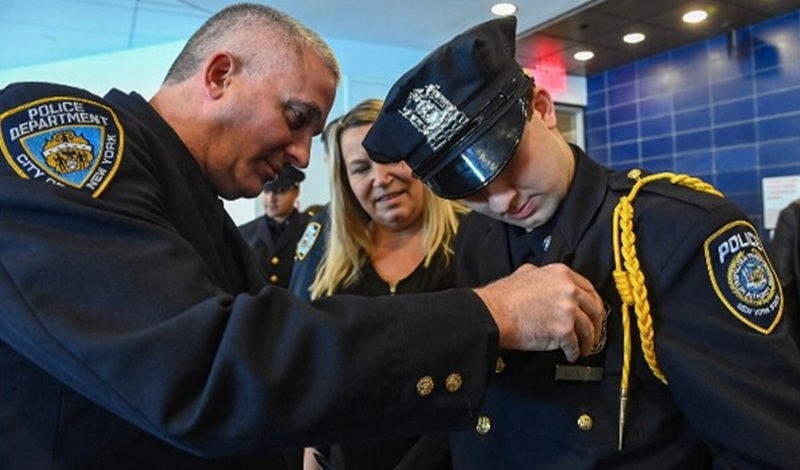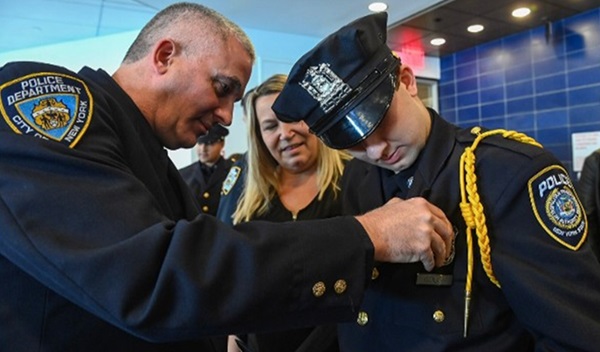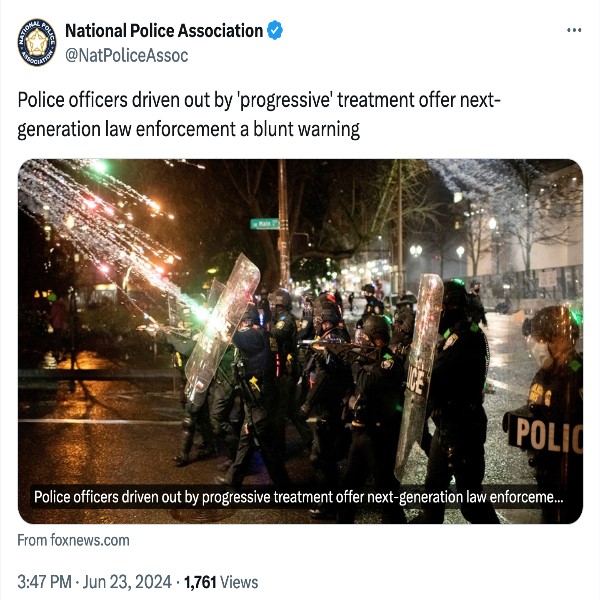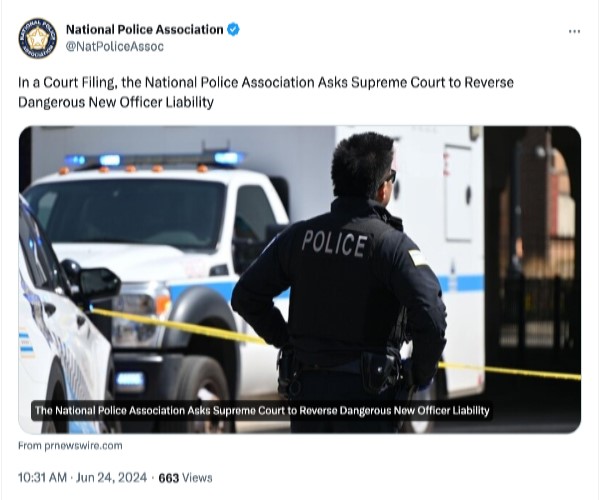
By Steve Pomper

I just finished reading former U.S. Army major and current FOX and Friends Weekend host Pete Hegseth’s new book, “The War on Warriors: Behind the Betrayal of the Men Who Keep Us Free.”
Betrayal.
Hegseth writes about the DEI, CRT, and Marxist infection the radicals are intentionally inflicting on the military, which is literally an existential threat to our nation. But much of the betrayal he recounts is an infection similarly afflicting law enforcement, which is also a national existential threat.
Every officer, especially in blue jurisdictions, will find Hegseth’s book jarring but recognizable, especially when Hegseth says he understands many veteran parents no longer encourage their kids to join this military.
Today, many police parents find they also can no longer in good conscience encourage their children to become cops because they can’t trust that officials will protect and defend their officers absent proof of legitimate wrongdoing.
Two law enforcement stories of cops’ betrayal by people using “the system” against them are distressing. Each illustrates the stabbing in the back of police by people who are supposed to protect them.
Cops may be ordinary citizens in many ways, but when acting behind the badge, they are society’s shield and sword arms. When thugs harm police officers, they are not only harming the individuals behind the badge, but also the society theoretically standing behind the officers.
The NPA recently posted a FOX News story by Michael Ruiz about the system’s stunning betrayal of former San Bernardino County Sheriff’s Deputy Meagan McCarthy. Not a lot of love for cops in Cali.

The former nursing school student said her career goals changed after she went on “a police ride-along” and realized just how important is the service officers provide a community.
According to FOX Digital News, she said, “The biggest takeaway that I honestly had from law enforcement … you really were the line between good and evil. We responded to things that if the cops wouldn’t have gotten there when they did, it would be horrible situations for people on top of already dangerous situations.”
But after one of the most harrowing incidents any officer can experience in which she was nearly murdered, even worse, after the way the “system” handled the prosecution of the suspect, she went from “thriving” in law enforcement to medically retiring and hoping “her three children choose not to follow her and her husband’s [also a deputy] footsteps and choose another profession – like fighting fires.”
What changed? I’ve written about cops whose superiors and other officials had inflicted moral injuries on officers by betraying their trust. I wrote, “This doesn’t only injure a person mentally, it wounds a person’s soul, so profound is the betrayal of an organization’s moral code.” The code where those in charge have implicitly or explicitly promised to have an officer’s back as long as they did the job honorably and in good faith. Not later determined—politically—to have been “wrong.”
But increasingly, that is not happening. Cops are being disciplined, fired, and even prosecuted and sitting in prison—for doing their jobs. Jobs society asked them to do. They’re also watching as the justice system insults police by letting criminals get away with assaulting and even killing them.
Deputy McCarthy was the first to arrive on a priority one call where a reportedly schizophrenic suspect bull rushed her without warning. The attack was so violent, the deputy suffered a black eye and a broken hand. Ruiz wrote, the suspect “pummeled her to the ground and took her sidearm.”
The deputy faced that nightmare situation cops dread—the criminal had her gun.
The video provided in the FOX article shows the suspect firing multiple times at her, some from point-blank range. You can hear shots the suspect is firing from above her and see the dirt spray upward as the rounds strike the ground next to Deputy McCarthy’s head. The deputy manages to get up and escape as the suspect continues shooting at her. Astonishingly, no rounds struck her.
Backup deputies arrived and arrested the suspect who’d surrendered. Then they provided first aid to Deputy McCarthy until an ambulance arrived.
But the incident transcended an officer’s physical injuries and mental trauma to the infliction of a moral injury when, as Ruiz wrote, “Jurors later found him not guilty of attempted murder”
.Not guilty! You read about and saw on video what the suspect (allegedly) did. How is that not attempted murder?
Officers now must ask questions like, how hard had the prosecution worked for a conviction? How did the defense frame the suspect’s actions? What were the instructions to the jury? Deputy McCarthy and other cops depend on the criminal justice system to let criminals know it’s not okay to shoot at cops. At least, it never used to be.
McCarthy believes the suspect’s “lenient treatment” was due to what she called “the Minneapolis Effect,” referring to former Minneapolis police officer Derek Chauvin’s conviction for murder in the 2021 in-police-custody overdose death of the canonized-by-the-left, convicted felon Saint George Floyd, during an investigation of a crime Floyd had been accused of committing.
Though not a direct comparison, her (Saint) Floyd reference shows some local, state, and federal criminal justice systems’ lack of respect for police officers doing their jobs. Her next comment sets up the second portion of this discussion: What can we do to help the police?
Expanding the conversation beyond a court failing to convict a suspect attempting to kill her, caught on video, McCarthy said, “Not only do law enforcement officers have to worry about their physical safety… they also have to worry about their livelihoods.”

According to a press release from the NPA at PR Newswire, “The National Police Association (NPA) has filed an amicus curiae brief with the Supreme Court of the United States asking it to reverse a ruling by the United States Court of Appeals for the Third Circuit that places police officers at financial risk for doing their jobs and endangers the public by threatening to overwhelm and make unavailable hospital emergency rooms.”
The Third Circuit Court of Appeals [serving the liberal districts of Delaware, New Jersey, and Eastern Pennsylvania], “ruled that police officers can be sued for taking a person suspected of being on drugs, who is showing no signs of distress, to a booking center that provides medical screening instead of a hospital.”
During a traffic stop, officers found reason to believe a suspect had ingested cocaine, including finding cocaine, marijuana, and drug paraphernalia in the car. They arrested the suspect and transported him to the Dauphin County Booking Center (jail), where the medical staff screened him and authorized his booking into jail.
Even though the suspect had exhibited no signs of being under the influence, Officer Daniel Kinsinger told the medical staff he believed the suspect had ingested cocaine. After a medical examination, they cleared the suspect for booking into jail. They would have transferred the suspect to a hospital if the jail’s medical staff hadn’t cleared him.
Reportedly, the suspect collapsed in his cell about an hour after arrival “and died at a local hospital three days later.”
Here’s where the system betrayed the officers in allowing the lawsuit: The amicus brief reads, “Mr. Thomas’s estate sued the involved officers, the medical-intake company, and the City of Harrisburg, alleging the officers acted deliberately indifferent to Mr. Thomas’s medical needs and that each officer failed to intervene and provide medical care.”
But the suspect had no observable “medical needs” at the time the jail staff decided to book him into jail. For what would the officers have “intervened?” What “medical care” could they have “provided” for a suspect showing no signs of medical distress?
“Deliberately indifferent?” From what I read, despite the seven officers at the scene saying they did not see the suspect “become ill or act under the influence,” Officer Kinsinger, was obviously concerned enough to press the jail’s medical staff about his belief that the suspect may have ingested cocaine—that’s hardly indifferent.
With the suspect not showing any effects of taking drugs, Officer Kinsinger could have said nothing, right? Instead, he did his job and told medical personal what he felt they needed to know. And his reward is that some U.S. Circuit judges are allowing a lawsuit against him.
Ask yourself what you would have done differently in Officer Kinsinger’s position. If the officers had believed the suspect had possibly swallowed cocaine but had observed signs of being under the influence or overdosing, they would likely have called for an ambulance at the scene. But there were no signs according to several witnesses: apparently, seven police officers, the booking staff, and the jail medical staff.
The Third Circuit seems to believe the officers should have, while having observed no signs of medical distress from the suspect, over-ruled the medical professionals at the jail and—what? —kidnapped the suspect from the jail and taken him to the hospital? And then tell the hospital staff—what?
Should the officer have said, “Hey, the medical staff at the booking center cleared this guy to be booked into jail.” As the hospital staff looked at the officer with quizzical expressions, he adds, “but I decided to over-rule those medical guys—you know—because I’m a cop, and I know better than they do? So, here he is.”
The ER doc asks, “But what’s wrong with him?”
The officer answers, “Nothing that anyone can see. But I’m not going to have a federal court decide that this guy’s family can sue my ass off for getting him the “wrong” medical attention at the jail if, in fifteen minutes the cocaine I told everyone I thought he’d ingested, finally kicks in, and he overdoses and dies.”
What a thing being a Monday morning quarterback with 20/20 hindsight can be. Pause for a second and ask yourself, knowing what the officer knew at the time, what other reasonable action could he have taken after medical professionals at the jail screened the suspect?
The NPA is essentially asking if the Third Circuit’s ruling means that any suspect who may “have taken drugs [has] a constitutional right to in-hospital medical care, even if non-hospital medical care is available and obtained.” Does this sound reasonable to you?
The NPA is asking the U.S. Supreme Court to accept the case for review and to reverse the lower court’s ruling.